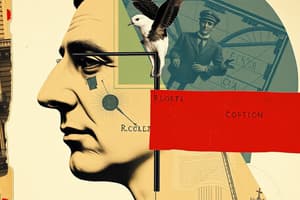Podcast
Questions and Answers
What is the main feature of Carl Rogers' self-concept theory?
What is the main feature of Carl Rogers' self-concept theory?
- The consequences of social comparison on self-esteem.
- The conflict between real and perceived identity.
- The differentiation between public and private self.
- The process of attaining self-actualization through self-concept. (correct)
What is the primary consequence of incongruence between the real self and ideal self?
What is the primary consequence of incongruence between the real self and ideal self?
- Effective social cognitive functioning
- Increased self-actualization
- Enhanced sense of self-worth
- Distress and anxiety (correct)
What does Rogers define as the 'real self'?
What does Rogers define as the 'real self'?
- The image of oneself constructed from societal expectations.
- The individual's perception of their desired achievements.
- The self constructed through social interactions and feedback.
- The innate feelings and thoughts about who one actually is. (correct)
How does unconditional positive regard affect a person's development according to Carl Rogers?
How does unconditional positive regard affect a person's development according to Carl Rogers?
What is the term Rogers uses to describe the alignment between the real self and the ideal self?
What is the term Rogers uses to describe the alignment between the real self and the ideal self?
Which of the following is NOT a core feature of human agency as described by Albert Bandura?
Which of the following is NOT a core feature of human agency as described by Albert Bandura?
What describes a person who possesses high self-efficacy?
What describes a person who possesses high self-efficacy?
Which of the following statements best describes the 'ideal self' according to Rogers?
Which of the following statements best describes the 'ideal self' according to Rogers?
Which aspect is NOT part of Carl Rogers' theory on self-concept?
Which aspect is NOT part of Carl Rogers' theory on self-concept?
According to Erik Erikson, personality develops through how many predetermined stages?
According to Erik Erikson, personality develops through how many predetermined stages?
Flashcards are hidden until you start studying
Study Notes
Intended Learning Outcomes
- Understand various representations and conceptualizations of self from a psychological perspective.
- Compare and contrast self-representations across different psychological theories.
- Analyze influences and factors that shape the self.
Pre-assessment Activity
- Activity focused on self-reflection through completing "I am" and "I should" phrases.
Carl Rogers: Real and Ideal Self
- Emphasized the innate drive in individuals to enhance and maintain themselves.
- Self-concept is central to achieving self-actualization, defined as thoughts and feelings about oneself.
- Two categories of self:
- Real Self: Awareness of who one actually is (e.g., skills, feelings).
- Ideal Self: Perception of who one aspires to be, shaped by external expectations (e.g., societal pressures).
- Congruence: Consistency between real self and ideal self leads to self-worth and a fulfilling life; incongruence leads to anxiety.
- Unconditional positive regard from parents fosters congruence and encourages self-actualization; conditional regard results in an ideal self based on conditions.
Albert Bandura: Social Cognitive Theory
- Introduced the concept of human agency, the ability of individuals to exert control over their lives.
- Key features of human agency:
- Intentionality: Actions done with purpose.
- Forethought: Anticipating outcomes of actions.
- Self-Reactiveness: Making choices and selecting actions.
- Self-Reflectiveness: Evaluating one's thoughts and actions.
- Self-Efficacy: The belief in one's capability to achieve desired outcomes; higher self-efficacy correlates with greater success.
- Self-Regulation: Ability to control one's behavior; higher self-efficacy enhances self-regulation abilities.
Erik Erikson: Psychosocial Stages of Development
- Personality develops through eight predetermined stages, each facing a psychosocial crisis.
- Successful resolution leads to healthy personality traits, while inadequate resolution can hinder future development.
Eight Psychosocial Stages
-
Basic Trust vs. Mistrust (Infancy 0-1 year): Relating to caregivers. Success leads to hope; failure leads to anxiety.
-
Autonomy vs. Shame and Doubt (Early Childhood 1-3 years): Developing independence. Success results in will; failure causes feelings of inadequacy.
-
Initiative vs. Guilt (Play Age 3-5 years): Initiating activities through exploration. Success fosters purpose; failure may result in guilt.
-
Industry vs. Inferiority (School Age 6-12 years): Acquiring skills and competencies. Success leads to competence; failure may result in low self-confidence.
-
Identity vs. Identity Confusion (Adolescence 12-20 years): Establishing self-identity. Success results in fidelity; failure can lead to role confusion.
-
Intimacy vs. Isolation (Young Adulthood 20-40 years): Forming intimate relationships. Success leads to love; failure leads to isolation.
-
Generativity vs. Stagnation (Middle Adulthood 40-60 years): Contributing to society. Success results in care; failure leads to self-absorption.
-
Integrity vs. Despair (Late Adulthood 60+ years): Reflecting on life achievements. Success results in wisdom; failure leads to regrets and despair.
Studying That Suits You
Use AI to generate personalized quizzes and flashcards to suit your learning preferences.




